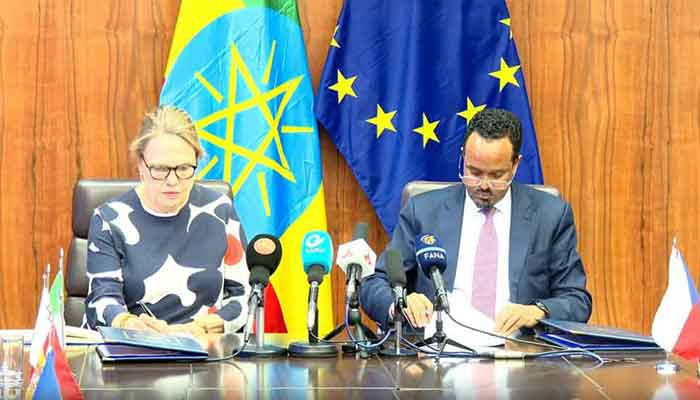
Ethiopia and the European Union (EU) signed a grant agreement today for €240 million within the framework of the Annual Action Program 2024 (AAP-2024), the Ministry of Finance reported.
Addis Ababa.- The AAP-2024 aims to address key areas for the African country’s development, including agro-industrial initiatives to boost the sector and create jobs for smallholder farmers, the Ministry of Finance stated.
It emphasizes the development of digital skills in Technical and Vocational Education and Training to boost economic growth, as well as the strengthening of democratic institutions by supporting governance and inclusion to promote stability and resilience in post-conflict situations. The program includes restoring basic health services to conflict-affected communities, providing psychosocial support to survivors of gender-based violence, and prioritizing comprehensive solutions to forced displacement to improve economic opportunities for displaced persons and refugees.
It also strengthens private sector participation in key value chains to ensure a comprehensive approach to sustainable development.
Ethiopian Minister of Finance Ahmed Shide and EU Ambassador Sofie From-Emmesberger signed the document in the presence of heads of diplomatic missions from EU Member States and various dignitaries, who endorsed enhanced cooperation in key development areas.
Shide highlighted the critical role of EU support in addressing Ethiopia’s pressing challenges, stating that this financing package is crucial to stimulating private sector investment, modernizing our tax and customs systems, and improving services in the agro-industrial, health, and education sectors.
From-Emmesberger commented on the importance of the 2024 APF, which reflects our collective commitment to sustainable development in Ethiopia. “It’s not just a financial agreement; it’s a manifestation of our shared values and goals for a prosperous future,” she emphasized.
This important event marks significant progress in the 50-year strategic partnership and underscores the vital support of the European Union in various development sectors in Addis Ababa, with an emphasis on regional integration through the Global Gateway Initiative.
With the latter, the EU plans to mobilize €300 billion by 2027 to assist developing nations, but, according to experts, it could exacerbate inequalities and primarily benefit European corporations. (PL)





